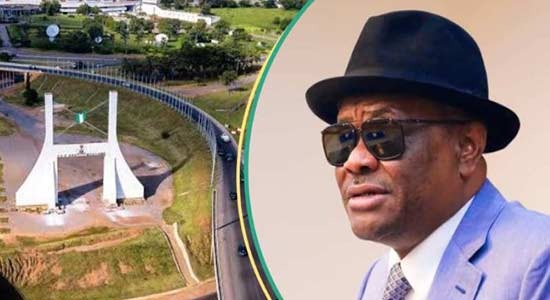With the swearing-in of the new ministers, Nigerians are looking forward to the immediate, medium and long term impacts the 45 ladies and gentlemen will bring to the country to change the negative spiral of the last decade and render the Renewed Hope agenda of President Bola Tinubu.
For residents of Nigeria’s administrative capital, Abuja, they are both excited and concerned in equal measure about the coming of former Rivers State governor, Barrister Nyesom Ezenwo Wike, as the minister of the Federal Capital Territory (FCT). For many, Wike’s record as Mr Project in his home state gives hope that he would significantly and positively impact on the poor infrastructural status of the capital territory, a departure from the recent past.
Wike’s steps in his early days in office show a man who understands some of the issues besetting the territory and is bullish about turning the FCT into a befitting nation’s capital. He has spoken about restoring its master plan, about improving its sanitation, about sanitizing land administration, about development control and so on. Particularly, he expressed his resolve to demolish buildings in unapproved areas and revoke undeveloped lands. He has also warned public servants to be diligent in the execution of their duties or move aside. Wike sounds like a man in a hurry to achieve his agenda and that of his principal in the FCT.
As FCT residents do not have a governor or mayor, the FCT minister is performing the president’s taskmaster as the administrator of the capital territory, while the president concentrates on the affairs of the entire nation. So it is quite encouraging that Wike is coming to the job from serving as a state governor. He is the first with such a resume, and the experience of running a state should come in handy. But unlike in the state where the governor owes his allegiance to the electorate, who can hold him accountable to his campaign promises, the FCT minister only answers to his principal, the president. Little wonder the nation’s capital has remained largely underdeveloped, save for a few districts.
However, since Wike has declared his intention to change the story of the FCT, he would need to have a listening ear or he would miss out on what the residents really need. First, there is a very poor public transportation system in the capital territory. There needs to be an integrated, efficient and affordable land and rail system that connects the diverse areas of the nation’s capital. That will, hopefully, ease the hardships of the residents and restrain the traffic crimes referred to as ‘one chance’ where residents are robbed and killed by boarding unmarked vehicles. The Urban Mass Transit systems should be retooled, expanded and made functional. The Abuja light rail system should also be brought on board. These will help to decongest the city centre.
Public health, in our opinion, is another area that must be given attention. The general hospitals in Abuja need holistic overhaul. Probably, less than five percent of the nation’s capital residents can afford private hospitals. The rest look to public hospitals to manage their health issues. But, unfortunately, the general hospitals are grossly ill-equipped and understaffed to cater for the needs of the public.
Added to this, in our view, is the poor attitude and sharp practices of many of the health workers. As a result, many who seek treatment in Abuja hospitals are frustrated. The health insurance scheme should be expanded to include more residents and made to work to purpose. At this moment, enrollees can hardly access most of the medicines prescribed for them, even when they are available in the hospital pharmacies due to sharp practices. We recommend that the minister order a probe of the scheme, so that it can begin to serve the purpose for which it was set up.
Public education is another area that needs intervention. Most families groan under the cost of sending their children and wards to private primary and secondary schools due to a lack of confidence in the public ones. Most of the schools lack the requisite staff commitment, supervision, learning tools and environment to produce the desired results.
Infrastructure is another area. Apart from a few districts in the city of Abuja, where a tiny fraction of the resident live, the vast majority of Abuja residents live in satellite towns and villages, characterised by terribly bad roads, absence of potable water, poor sanitation, poor power supply, poor flood control, and other basic necessities of life. In fact, most residents in these areas do not feel the presence of government.
Wike should open up Abuja hinterlands with a good road network and other basic amenities. The Area Councils should also be made to be alive to their responsibilities and account for the monies that accrue to them through federation account. Their impact is not being felt by most residents.
Security is another area of concern. Abuja residents no longer feel safe anywhere. Crime is more prevalent these days. Theft, burglary and ‘once chance’ crimes used to be the major concerns but now kidnapping incidents are increasingly being reported, especially in areas bordering neigbouring states like Niger State where banditry is rife. The FCT should equip the security agencies with modern crime fighting tools and make them do their job.
Perhaps the most challenging is housing and accommodation. Most residents spend the biggest chunk of their earnings on prohibitive rents that keep rising. While housing is a private enterprise, the FCT administration should bring some policies to protect the weak from Shylock landlords. The FCT administration should also consider a social housing scheme to cater for low income earners.
Finally, as Wike begins his stint as FCT minister, he should remember that Nigerians have been hard-pressed by the economic policies of the administration he serves and that he will be judged by how many Abuja residents his administration uplifts their living conditions, not the other way round.





